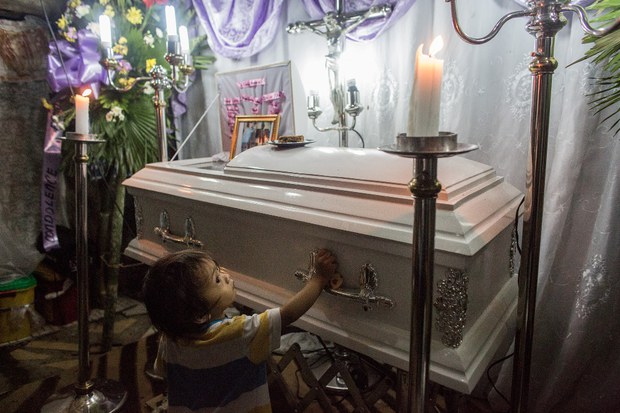Manila Rejects Call for UN Probe into Drug-War Killings
2019.07.05
Manila
 A child plays in front of the casket of Myca Ulpina, a 3-year-old girl who was killed in crossfire between police and Myca’s father, a drug suspect, during a wake for the dead girl in Rizal province, Philippines, July 5, 2019.
A child plays in front of the casket of Myca Ulpina, a 3-year-old girl who was killed in crossfire between police and Myca’s father, a drug suspect, during a wake for the dead girl in Rizal province, Philippines, July 5, 2019.
The Philippine government on Friday rejected a European-led call for the United Nations to investigate the extrajudicial killings of thousands of people by law enforcement agencies in the Duterte administration’s war on illegal drugs.
Iceland led more than two dozen countries in submitting a draft resolution Thursday calling on the United Nations Human Rights Council to probe the killings. The draft urged the Philippines “to take all necessary measures to prevent extrajudicial killings and enforced disappearances,” and to cooperate with the Office of the U.N. High Commissioner for Human Rights in its investigation.
The Philippine government’s response to such calls remains unchanged, Salvador Panelo, spokesman for President Rodrigo Duterte, said on Friday evening.
“No government of any nation knows the actual and real state of our country’s domestic affairs better than this government. Any attempt therefore by any foreign country to interfere with how this government maintains its peace and order, not only is an affront to their intellect but an interference with the country’s sovereignty as well,” Panelo said.
“To those foreign governments which have been misled by false news and untruthful narratives about the President’s war against illegal narcotics, we reiterate that drug-related deaths arising therefrom are neither state-initiated nor sponsored,” he said.
Killings during counter-narcotics operations resulted when suspects “violently resist arrest that endangers the lives of the law enforcers who act in self-defense, which is sanctioned by law,” he added.
The draft resolution was submitted to the U.N.’s human rights body in Geneva weeks after the Philippine national police said that the number of suspected drug dealers and addicts killed since Duterte took office in mid-2016 had reached 6,600. Rights groups have estimated a much higher death toll of between 20,000 and 30,000.
President Duterte cannot use Philippine sovereignty as a reason for trying to block a U.N. investigation into the killings, according to Carlos Conde, Philippine researcher for Human Rights Watch. Duterte, in earlier rejecting international calls to subject him to investigations, had insisted that the Philippine justice system was working fine.
“If the government insists its ‘drug war’ is legitimate and done in a manner that is respectful of human rights laws and standards, why is it resisting the resolution? Why is it blocking all attempts by the U.N. human rights experts to do their jobs?” Conde said.
He stressed that the draft U.N. resolution was “quite modest” in its scope and requests.
‘Shit happens during operations’
Meanwhile, first-year Sen. Ronald dela Rosa, Duterte’s former chief of national police who had launched the war on drugs three years ago, caused a furor when he appeared to belittle the accidental killing of a small girl during a drug raid.
Myca Ulpina, 3, was killed while allegedly being used as human shield by her drug suspect father, Renato Dolofrina, during a police operation on Sunday in Rizal province.
“[W]e are in an imperfect world. If you’re a policeman, do you want a child to be hit? Never, because you have a child as well. You don’t want something like that to happen. But shit happens during operations, shit happens,” Dela Rosa said.
Rights groups and advocates said claims that the girl was a casualty of “collateral damage” were false, as they called for the government to be censured over the senator’s comment.
“She would’ve turned four by the end of July, but [her] life was cut short in the hands of those who swore to protect her,” said Jacqueline Anne de Guia, spokeswoman for the Commission on Human Rights. “[Minors] are victims. Their hopes and dreams fall short once a bullet enters their bodies.”
![190705-PH-girl-1000.jpg Photos of Myca Ulpina, a 3-year-old Filipina who was killed by gunfire during a police counter-narcotics operation, are seen during her wake in Rizal province, Philippines, July 5, 2019. [Basilio Sepe/BenarNews]](/english/news/philippine/UN-Philippines-drug-war-07052019134507.html/190705-PH-girl-1000.jpg/@@images/f34d2638-8d40-48f3-b128-2d15f68a44ef.jpeg)
Senators from the opposition also criticized Dela Rosa.
“Shit happens? Then it’s time to call a plumber & flush this bloody & abusive drug war down the toilet,” Sen. Risa Hontiveros said.
On Wednesday, current national police Oscar Albayalde said his department was investigating the operation that resulted in Myka’s death.
President Duterte began his crackdown on narcotics shortly after taking office in June 2016. He vowed to dump the dead bodies of drug dealers and addicts, as well as turn Manila Bay red with their blood. He has since repeatedly urged police to shoot drug suspects.
In April, Mr. Duterte admitted that it appeared that he would be leaving office in 2022 without ending the country’s drug problem. He claimed that his war against narcotics had failed but said the blame should lie with “narcopoliticians” flooding the market with illicit drugs.
Jeoffrey Maitem contributed to this report from Cotabato City, Philippines.







